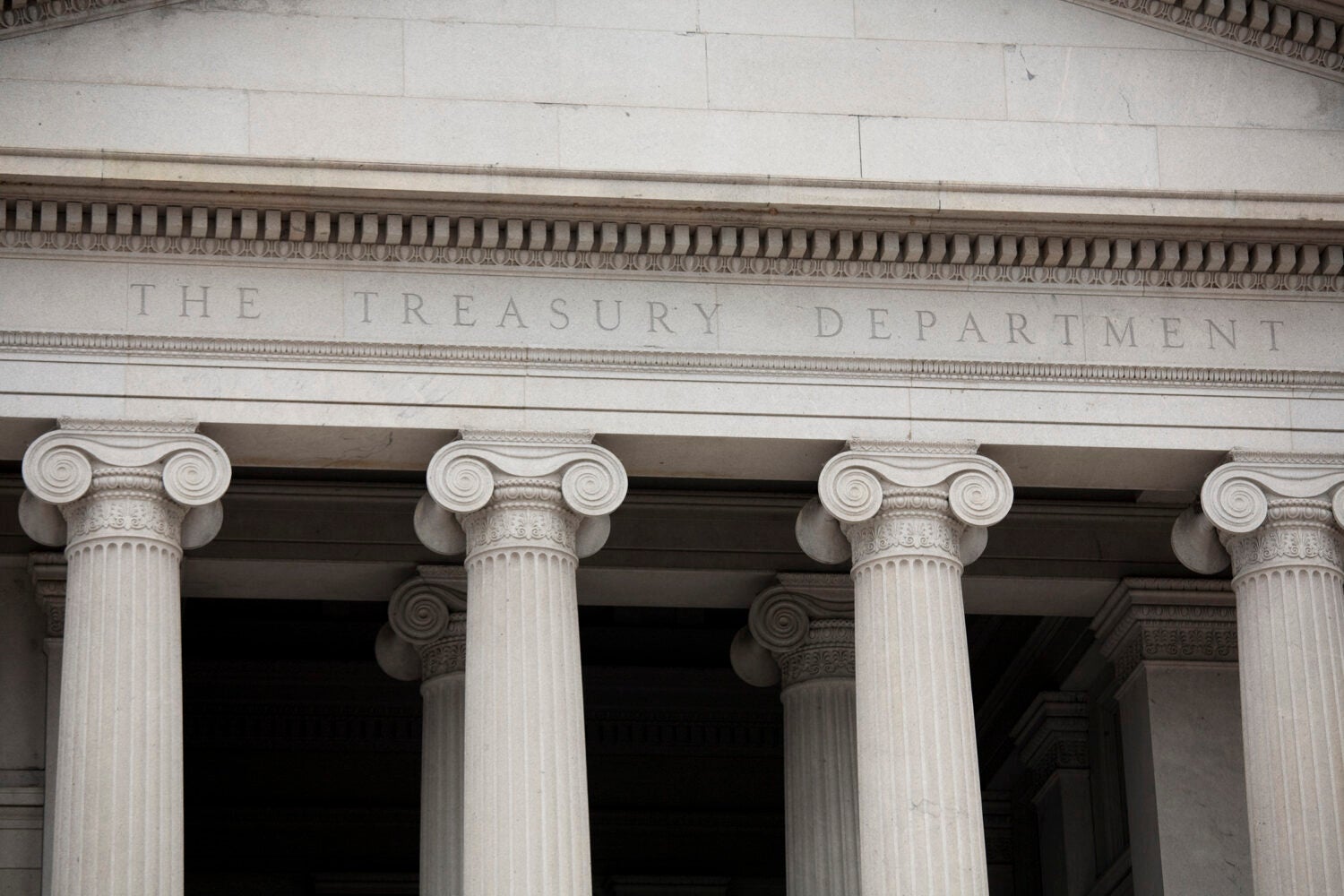The United States is yet again bumping up against the debt ceiling, the amount Congress has authorized the federal government to borrow to pay its bills, including bond payments, Social Security checks, and salaries for federal employees and members of the military. While legislators attempt to negotiate a path forward, Treasury Secretary Janet Yellen has already started employing so-called “extraordinary measures” to stave off what many experts believe would be a disastrous default. But creatively moving money between government accounts will only work for so long.
In 2021, Harvard Law Today spoke to Professor Howell Jackson — an expert in financial regulation and federal budget policy, and author of a paper analyzing a previous standoff “The 2001 Debt Ceiling Impasse Revisited” — about what could happen if the United States defaults on its debts for the first time in history. That original conversation has been updated to respond to recent events and presented again below.

Harvard Law Today: Can you explain what the debt ceiling is, how it started, and why it matters?
Howell Jackson: The debt ceiling exists because Congress has the authority not just to spend, but to control borrowing. Rather than give the government carte blanche to borrow, Congress has traditionally set limits on how much could be borrowed. And when we’re running deficits, as we are now, the debt increases over time and eventually approaches the debt ceiling. During the first phase of a debt ceiling crisis, the government can take what are known as extraordinary measures — authorized ways in which the government can play with its debt capacity by drawing down its bank account with the Federal Reserve Bank or by fiddling around with different intra-governmental accounts — to gain extra latitude. But those measures eventually run out, at which point, if nothing happens, there would be a crisis of the sort we’ve never experienced before.
HLT: I’ve heard this situation compared to paying off a credit card. Is that an apt analogy?
Jackson: The way I would characterize it is that Congress, with the president signing the legislation, has authorized expenditures, and has also set taxes and other revenue sources. Because we’re in a deficit mode, we are spending more each month than we take in. For every dollar we’re projected to spend in the current fiscal year, we’re bringing in something like 80 cents of revenue. So, 20 cents of every dollar of federal spending needs to be borrowed. Congress has authorized the spending, but the checks go out in the future. The dilemma of the debt crisis is that the ceiling limits the capacity of the government to borrow. You’re hitting the credit card limit. And at that point, the question that comes up is who gets paid?
HLT: Right. So, who does get paid?
Jackson: The government can’t pay everyone, and the received wisdom is that we would not just pay 80 cents on the dollar. It’s usually thought we would do one of two things. First, the government could pay the bills as they come in. And as the days go on, everyone’s payments would be delayed, and we would technically be in default on the national debt, Social Security payments, military spending, and everything else. Alternatively, we could prioritize certain payments, such as the debt payments. And then we don’t pay Social Security until we have the cash. Or we could put Social Security first and not pay the debt. It’s generally thought that if you don’t pay the debt, the financial markets will have a very bad reaction. But even if we do pay the debt, and we’re defaulting on other claims, that probably would be a pretty bad situation for the capital markets as well. So, there’s not a great way to prioritize, but the alternatives would affect the economy and people very differently.
HLT: How bad would the short-term impact be?
Jackson: I think you would see a massive amount of confusion in the financial markets, because Treasury bills are taken to be the safe asset and the pricing of all other financial assets is built off of that. If Treasuries suddenly become riskier — and I think that there will be a perception that they were riskier if we defaulted — interest rates for them and other financial assets would go up. And it’s generally expected that there would be chaos.
One thing that’s a bit different in this crisis is we now know a little bit more about what the Federal Reserve might do if there were a debt crisis. Minutes from a Federal Open Market Committee meeting back in 2013 are now available and explain in some detail about what the Fed’s plans would have been back then when we almost got to a debt crisis. Undoubtedly, senior leadership at the Fed is having similar conversations today. Another thing that is novel in the current environment is that the political branches — really House Republicans — are having more explicit discussions of prioritization of payments in the event that the debt ceiling is not adjusted in a timely manner. It is not at all clear how this will play out. These proposals would have legal effect only if enacted into legislation. But there are genuine political risks in favoring one group of claimants over others, which is why congressional leaders in the past have typically tended to say that it is the president’s responsibility to decide who would get paid in a genuine debt ceiling crisis.
I would be very worried if members of Congress got the idea that failing to raise the debt ceiling is like a government shutdown, that they could just miss the date by a couple of days, and that it would be no big deal. No one really knows what will happen, but it can’t be good. Hitting the debt ceiling will probably push up the government’s borrowing costs in the short term and maybe also in the long term. With the huge debt overhang we have today, that’s something that would be really disadvantageous to everybody.
HLT: You’ve spoken about financial markets, but how would this impact average Americans?
Jackson: For individuals, two things would happen. One, and this would be tragic, is that there would be an interruption in Social Security payments and other public benefits program. Many of our elderly and most vulnerable are entirely dependent on federal support. Of course, there’s also paychecks for government employees and the military plus implications for military preparedness if defense spending is disrupted. And if there were a financial turmoil of the sort that we had in 2008 or in March 2020 with the pandemic, there would be many knock-on effects, such as a precipitous decline in equity markets and 401(k) balances. A genuine debt ceiling crisis could precipitate a recession or worse. And the economy is not totally recovered from the pandemic. It’s just not the kind of thing that you want to roll the dice on. In almost any scenario, individuals would be adversely affected, because if there had to be prioritization, many individual government benefits would be held up, unless the Biden administration were willing to try some fairly extravagant legal strategies that have been discussed.
“A genuine debt ceiling crisis could precipitate a recession or worse. And the economy is not totally recovered from the pandemic. It’s just not the kind of thing that you want to roll the dice on.”
HLT: Let’s talk about some of those extravagant legal strategies. In the past, I’ve read people discussing the 14th Amendment in this context.
Jackson: Yes, the 14th amendment does say that the public debt shall not be questioned. And then it goes on to say something else about veteran pensions, because it was put in place after the Civil War to ensure that the federal debt and veterans’ pensions would be honored. When I was a young lawyer in Washington, there was an old guy who would march around Lafayette Park with a poster saying, “I question the public debt.” And it was sort of amusing that he could be violating the Constitution for doing that. But whatever questioning the public debt means, there has been scant Supreme Court discussion of it. One argument is that the debt ceiling itself questions the public debt, and it’s therefore unconstitutional. Or some see in the 14th Amendment an authorization for the president to say that the spending and tax decisions of Congress are of primary importance and the debt limit is secondary. Under this view, the president could unilaterally continue to issue debt. But that’s not exactly what the 14th Amendment says; it’s a creative extrapolation. And if you’re a capital market investor, and someone is trying to sell you debt under that theory, are you happy to buy it?
Another strategy that’s been advanced, which has a certain visual appeal, is that the Treasury should use its authority to mint money to create a platinum coin worth a trillion dollars, then roll the coin down Constitution Avenue to the Fed, and deposit it there. Supposedly, the Treasury’s bank account at the Fed then has a trillion more dollars, and the government can start sending out more checks. Again, that’s not what the minting authority was contemplated to be used for. And Congress did set a debt ceiling, and the platinum coin ploy strikes many as a disingenuous maneuver to issue new “debt” not technically covered by the ceiling. So, it’s an amusing idea, but, in my view, a kind of gimmick that senior Treasury officials will not be eager to buy into.
HLT: What kinds of international impacts would we likely see?
Jackson: There is no doubt that foreigners look at our fiscal shenanigans and are, at best, bemused that our federal government periodically shuts down. Hitting the debt ceiling would be much worse. It would threaten the dollar. And even if we don’t ultimately hit the debt ceiling, simply having this conversation now is not a good thing for an already fragile world economy. In addition, the dollar is the world’s reserve currency. That’s a huge benefit for us financially and in terms of prestige, national security, and global leadership. But there are countries and other interests around the world who would like to move away from the dollar. This kind of amateurish treatment of our financial system emboldens forces that are already looking for alternatives to the dollar.
“There is no doubt that foreigners look at our fiscal shenanigans and are, at best, bemused that our federal government periodically shuts down.”
HLT: You described what’s happening as shenanigans. But we’ve seen these types of situations several times before. So, what good does the debt ceiling achieve?
Jackson: I’ll stick with shenanigans, because the debt ceiling has become a kabuki dance in which politicians of both parties have postured in the past. The dangerous thing is that members of Congress might miscalculate or misunderstand the implications of missing the deadline by a day or two.
HLT: Does the debt ceiling do anything besides create headaches for the Treasury Department every couple of years?
Well, the case in favor of a debt limit is that offers an episodic opportunity for the country to ask itself whether we are we running our fiscal affairs in a sensible way or whether the accumulated public debt is getting too large. The problem is that the way debt ceiling crises now unfold, those serious conversations don’t happen. So, while I believe we should have a national debate about our fiscal challenges, playing chicken with the debt ceiling is clearly not a productive way to undertake that conversation.
This conversation, originally published in October 2021, has been edited for length, clarity, and timeliness.
Want to stay up to date with Harvard Law Today? Sign up for our weekly newsletter.
